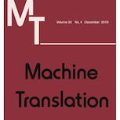Compared to conventional bilingual translation systems, massively multilingual machine translation is appealing because a single model can translate into multiple languages and benefit from knowledge transfer for low resource languages. On the other hand, massively multilingual models suffer from the curse of multilinguality, unless scaling their size massively, which increases their training and inference costs. Sparse Mixture-of-Experts models are a way to drastically increase model capacity without the need for a proportional amount of computing. The recently released NLLB-200 is an example of such a model. It covers 202 languages but requires at least four 32GB GPUs just for inference. In this work, we propose a pruning method that allows the removal of up to 80\% of experts with a negligible loss in translation quality, which makes it feasible to run the model on a single 32GB GPU. Further analysis suggests that our pruning metrics allow to identify language-specific experts and prune non-relevant experts for a given language pair.
翻译:暂无翻译




